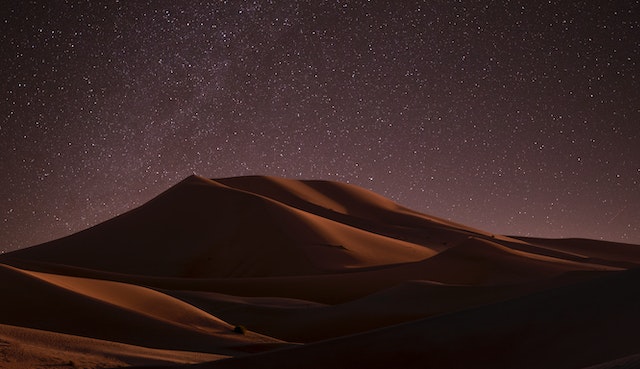
Why are deserts cold at night? The sand reflects the heat up and the air cannot hold the heat in.
Deserts have very high temperature extremes. The Sahara Desert, for example, has an average daytime high of 38 ˚C and an average nighttime low of 4 ˚C. If you are stuck in the desert, you might find yourself suffering from hyperthermia in the daytime and hypothermia at night. Deserts get so hot and then so cold because of two reasons: the lack of humidity and the sand they are made of.
Deserts are usually made of sand. All deserts were once lush regions but when the climate changed, it warmed up the area and the rainfall stopped. Once the rainfall stopped, the vegetation died off and there were no more leaves to shade the ground or roots to hold the soil together. The soil was blown away without this protection, leaving only the sand. This sand is one of the reasons why deserts get very hot during the day and very cold at night.
Sand particles are different from soil because they don’t absorb heat or water. Sand particles are much larger than soil but have very low permeability. This means any water there is will get stuck in airholes in the sand and then evaporate very quickly. Sand also doesn’t absorb heat very well. The surface of the desert will absorb some heat, but it stays on the surface and doesn’t transfer down to lower layers. That is why the surface of a beach feels hot to the touch but the sand is cool if you dig down a little. The surface of the sand is also very reflective, so a lot of the heat from the sun is reflected back up where it heats the air above the desert. This is why deserts are very hot during the day. However, at night, there is no heat from the sun and the sand very quickly loses the heat it is holding.
The second reason is the lack of humidity and this is what makes the area a desert in the first place. Deserts are usually found at the equator, or in the middle of a continent behind a mountain range. The sun heats the equator more than it does any other part of Earth and the heat evaporates the moisture from the land and the air. The warm, dry air rises up and heads towards the poles where it sinks again. This motion of the air causes the trade winds and it means that the air above deserts is very dry. Deserts are also usually behind a mountain range. Moist air comes in off the sea, rises up to go over the mountains, and drops most of its moisture as rain. When the air arrives on the other side of the mountain, it has no moisture and the lack of rain causes deserts to form.
Dry air is the second reason why deserts are cold at night. Water can hold a lot of heat energy, and moist, humid air will trap a layer of heat close to the ground. This heat will dissipate through the night, but not enough to get cold. That is why tropical places are warm both day and night. It is also why nights are warmer if there are clouds than if there aren’t. In a desert, the sand reflects heat back up into the air, which is very warm during the day. However, there is no water in the air to trap this heat, so once the sun has gone, it dissipates very quickly, and the temperature plummets.
How do animals deal with this heat discrepancy? Many of the animals that live in the desert either burrow to escape the heat during the day or burrow to escape the cold during the night. Animals such as snakes are cold-blooded, and they need the heat of the sun and the sand to be able to move. They are active during the day and they burrow into the sand at night to keep warm. Scorpions are the same. Mammals that live in deserts, such as the sand cat and the kangaroo rat, tend to be nocturnal. They burrow into the sand during the day to keep cool and go hunting at night. Being slightly under the surface of the sand keeps them cool.
Photo by Walid Ahmad: https://www.pexels.com/photo/desert-during-nighttime-847402/
Sources
https://www.labxchange.org/library/items/lb:LabXchange:4b4895cb:html:1
https://www.livescience.com/why-do-deserts-get-cold-at-night.html
https://www.livescience.com/planet-earth/why-are-deserts-dry
